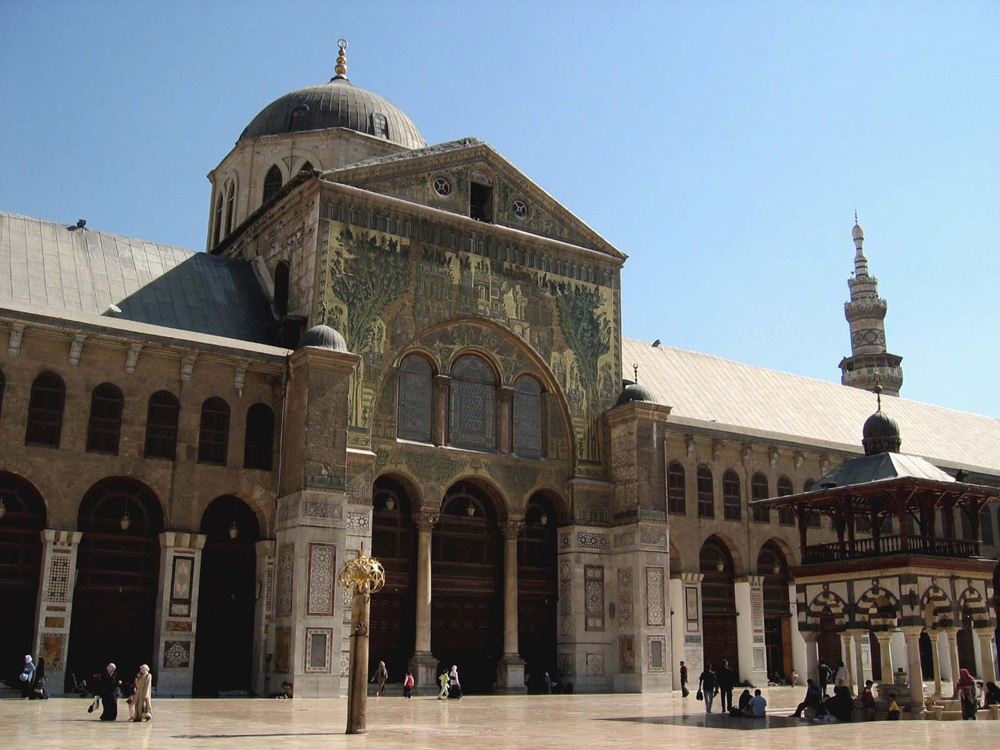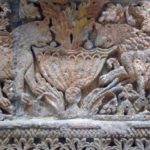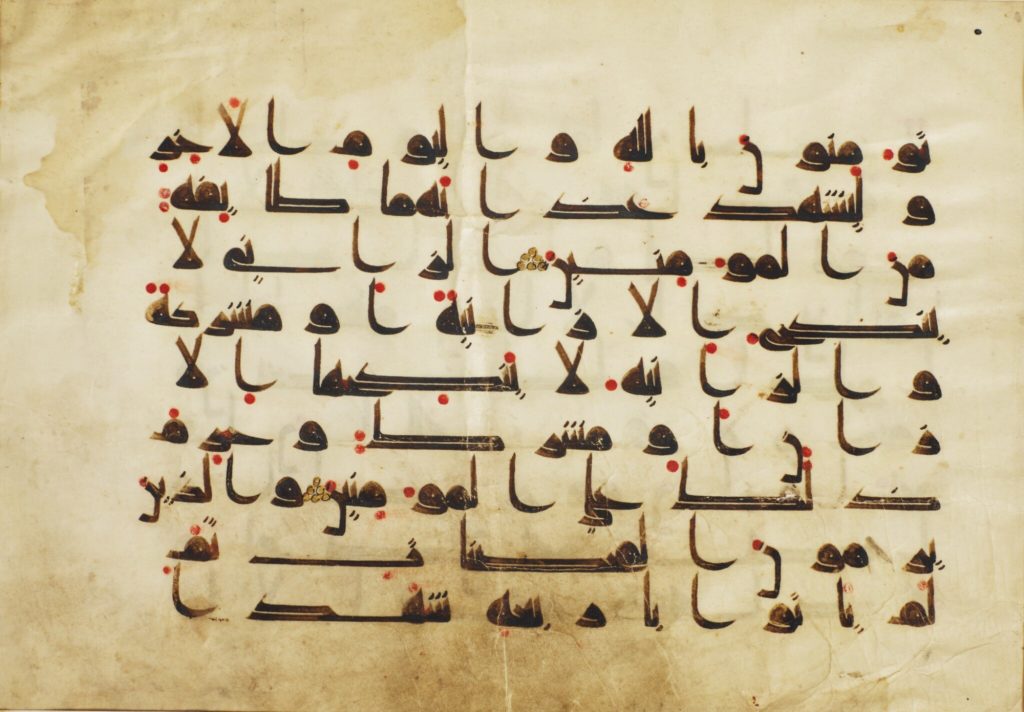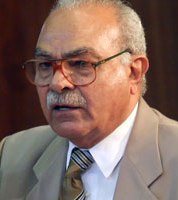
Since the dawn of the caliphate, the faqīh has sat with the sultan, shaping our Islam for us, an Islam that Islamizes and excommunicates according to the extent of the citizen’s commitment to the master’s doctrine – the doctrine of the rulers and those in authority, with obedience to them a divine command and a heavenly obligation.
EVER SINCE the armies of Abū Bakr went out to fight those who abandoned zakāh in the name of the faith and religious righteousness, the meaning of Muslim armies going out to fight the infidels became fights “other than the futūḥāt (‘the wars of conquest’)”. These wars were to eliminate those who object or disagree with a political opinion transformed into a religion, so that slaughtering, burning, and captivity could be seen as taking place in the name of faith and not due to some political dispute.
But a cursory look at the history of the Muslim Arabs will reveal that contrary to the legendary “O Muʽtasim” cry[1], the response was a thousand different “O Islam” cries. The issue was at its most patent in the time of the caliph ‘Ūthmān ibn ʽAffān, who demolished the stomach of ‘Ammār ibn Yāsir by beatings and kickings, and broke the ribs of Ibn Masʽūd the favourite of the Messenger of God, and exiled Abu Dharr to Rabdha. The Muslims then proceeded to kill their caliph, who met his end at the hands of the Companions and their sons. After that, Islamic sectarians went forth fighting and excommunicating each other, until fifteen thousand Muslims perished at the battle aroundʽA’isha’s camel,[2] and subsequently a hundred and ten thousand Muslims at the battle of Siffin.[3] No one knows which of these victims are to be described as ‘martyrs’ and which as ‘unjust slanderers!’
The conversion of Muʽāwiya ibn Abī Sufyān and his son Yazīd to Islam did not prevent them from fighting the family of the Prophet and cutting off the head of Ḥusayn
As for the time of Muʽāwiya and his son Yazīd, no embarrassment is felt as to what happened to the family of the Prophet, or how Ḥusayn’s head was cut off and sent to the capital, or how Zayd ibn ʽAlī’s head was mounted on a spearhead and then planted on the tomb of his grandfather, the Messenger of God! And if Muslims forget the year, the rest of the sects do not forget these momentous events that divided the Muslims into parties and denominations, all of which swept aside matters of faith in the cause of politics, worldly power and authority.
And if Muslims forget or pretend to forget, then history assaults our ears with the words of Muslim ibn ‘Uqba al-Marrī as he punished Yathrib[4], the city of the Messenger of God and the Companions and Followers[5] on the orders of the Qurayshī caliph Yazīd bin Muʽāwiya. He killed these figures at the battle of al-Ḥarra – historically one of our great sources of shame, when the army was left free to rape the women of Madīna for three days, as a result of which a thousand virgins became pregnant through fornication and public rape, notwithstanding that they were Muslims related to the Companions, even their daughters.
As for Ziyād ibn Abīhi the Umayyads ruler over the territory of Iraq, he licensed the killing by suspicion alone, even the innocent, in order to intimidate the guilty, and legalised the slaying of women. As for his deputy, the Companion Samra bin Jundub, his hands were stained merely with the blood of eight thousand people in Iraq, on the basis of conjecture and suspicion. Indeed, the application of Islamic ḥudūd penalties[6] took on a cynical form as the demonstration of naked power, not as a ruling of faith. This was the case of Al-Miswar ibn Makhrama who had denounced the Caliph’s drinking of alcohol; in order to fulfill the demands of the religious law Caliph ordered the implementation of the ḥadd penalty of flogging for this, not upon himself however, but on Al-Miswar ibn Makhrama.
One should not be amazed at the acts of the authorities in power and their earnest desire for piety and care for the pious. When news came to ‘Abd al-Malik ibn Marwān – dubbed ‘the dove of the mosque’ because of his long stays in the mosque, the length of his Qur’ān reading and his days and nights spent praying – that he had been appointed caliph, he immediately closed the covers of the Qur’ān and said to it: “This is the end of my covenant with you.” He then addressed the populace with a sermon saying: “By Allah, no one henceforth is to tell me to fear God, on pain of decapitation.”
Al-Ḥajjāj ibn Yūsuf al-Thaqafī executed 120,000 Iraqis and abused Muslim women
Al-Ḥajjāj bin Yūsuf al-Thaqafī must make an appearance here, as counselor to the Caliph, since he was the one who promulgated the final edition of the Qur’ān after having worked with the state’s scholars to correct the ‘Uthmānī version, point it and vocalise it[7] under his constant personal supervision (even though his love of wine or entertainments remained an open question). He was also the man who steeped himself in Muslim blood for the flimsiest of reasons, by decapitation. He stated: “By Allah, whenever I command someone to exit a mosque I strike off his head.” He is one of five whom ‘Umar ibn ‘Abd al-‘Azīz mentioned before his succession to the caliphate when he said: “Al-Ḥajjāj is in Iraq, Al-Walīd is in the Levant, Qurra is in Egypt, ‘Uthmān is in Madīna, and Khālid is in Makka. Oh God, the world has been filled with tyranny and injustice.”
Al-Ḥajjāj followed the example of his predecessor Ziyād in executing women and arresting the family members of the wanted person until he surrendered himself, in preventing gatherings and sending soldiers into people’s homes and invading families, stamping on their honour in whatever manner they so chose in order to humiliate people and shatter their human dignity. Over the twenty-year period of his rule he executed 120,000 Iraqis, beheading them with the sword or slaying them from the back or cutting their necks, without troubling himself to know who these people were and why they were slaughtered except, that is, on some pretext of offence against honour, or simply due to some suspicion or conjecture.
These gentlemen derived pleasure and even blood-soaked humour in slaughtering others and burning them alive. During the conquest of Jurjān, in return for their surrendering the city, the inhabitants of Ṭamasiyya begged the Muslim commander Saʽīd ibn al-ʽĀṣ (the cousin of the reigning caliph ‘Uthmān ibn ʽAffān) not to kill a single man among them. On the commander’s agreeing to this they opened up the gates of the citadel, at which point the man decided to amuse himself and laugh at his joke while killing all of them except ‘a single man’!
The ‘Abbāsids killed 50,000 of the inhabitants of Damascus and turned the Umayyad Mosque into a stable for their horses
When the ‘Abbāsids came to power, they inflicted a massive purification campaign on 50,000 inhabitants of Damascus who were slaughtered, with their Umayyad Mosque turned into a stable for their horses. Whey their rule was secured they perpetuated the Umayyad behaviour of oppressing slaves and trampling on the humanity of men. It prompted uprisings which ended up with the insurgents being roasted over fires, or thrown to wild animals in Roman-style celebrations.
Such was the fate of the individual, whether an ordinary citizen or a soldier in the armies of the Sultan, in anything other than in brief interludes throughout our happy history and the ‘golden period’ which Dr. Muhammad ‘Ammāra seeks to restore. What is his reasoning? in a work entitled The Characteristics of the Islamic State he tells us that Islamic law in these periods “surpassed all other laws, civilizations, and international laws, in that it made fighting and war an abominable exception that Muslims do not resort to except in extreme necessity.” Dr. ‘Ammāra therefore believes that “the Islamic State did not deviate from this peaceful approach, even granting the believers guarantees on the freedom to live in safety in their countries”.[8]

Suggested Reading
But what does the noble doctor have to say about that massive body of evidence from the history of what he calls the ‘Islamic State’? For this is the Islamic state they want to restore so as to recreate the caliphate, liberate Palestine and Iraq, and re-establish a strong empire. It was a ‘golden period’ in all of its ‘golden’ meanings for conquerors, ghāzī rulers and their retinues of custodians of religion and merchants, yet it was a miserable, degrading, bloody period for those who were ruled over, attacked , and conquered.
And if anyone says here that this was ‘just the way things were’, there is absolutely no disagreement about that. And if anyone says that one cannot judge these periods according to the moral standards of the present day, there is also no disagreement. The disagreement comes as soon as it is said that this form of government and its systems should be restored as something to be hoped for. Here we are entirely entitled to judge it according to the moral standards of the present day, and see whether it really is the dream which have long desired and the hope that has been lost, or whether it will end up being the end of the “best community that hath been raised up for mankind”![9]
[1] ‘Wā Muʽtaṣimāh’, according to some traditional accounts, was the cry of a Muslim woman who had sought the help of the Caliph Al-Muʽtaṣim against the Byzantines, in response to which Al-Muʽtaṣim directed his forces to her rescue. It became a symbol for those who seek someone’s help. (Ed.)
[2] ‘The Battle of the Camel’ took place near Basra in 656 AD. It was fought between on the one side the army of the fourth caliph ‘Alī and on the other side by a rebel army led by ‘Ā’isha, Ṭalḥa and Zubayr, from which the forces of ‘Alī emerged victorious. (Ed.)
[3] The Battle of Ṣiffīn was fought in 657 AD between the caliph ‘Alī and Muʽāwiya ibn Abī Sufyān the governor of Syria. The fighting stopped after the Syrians called for arbitration, which ended inconclusively in 658. The battle is considered part of the First Fitna and a step towards the establishment of the Umayyad Caliphate. (Ed.)
[4] An earlier name for Madīna.
[5] See Glossary: ‘Ṣaḥāba’ and ‘Tābi‘ī’.
[6] See Glossary: ‘Ḥadd’.
[7] Up to this point the Qur’ānic text had no dots to distinguish letters that were similar in form, nor vowels to distinguish, for instance, active and passive forms of the verb, leading to discrepancies in reading and interpretation. (Ed.)
[8] See his articles on Religious Wars and Monotheistic Religions, pp.7-8.
[9] Ye are the best community that hath been raised up for mankind. Ye enjoin right conduct and forbid indecency; and ye believe in Allah [Qur’ān III (Āl ‘Imrān) 110].
Main image: The Umayyad Mosque in Damascus: turned by the ‘Abbāsids into a stable for horses.


